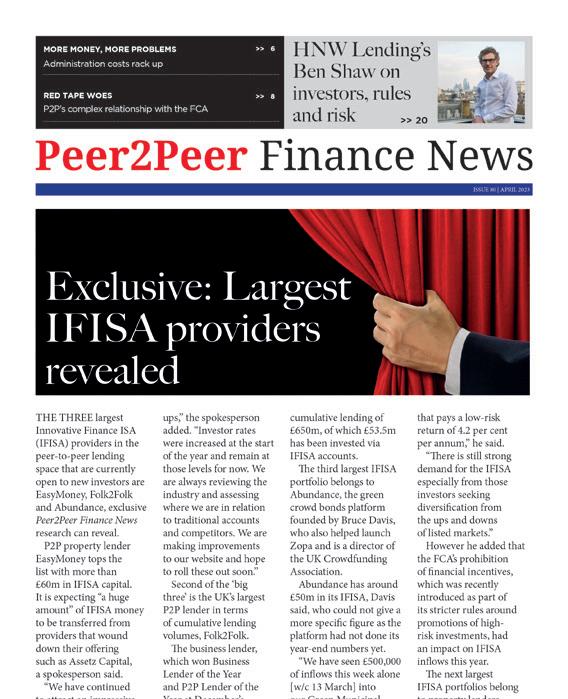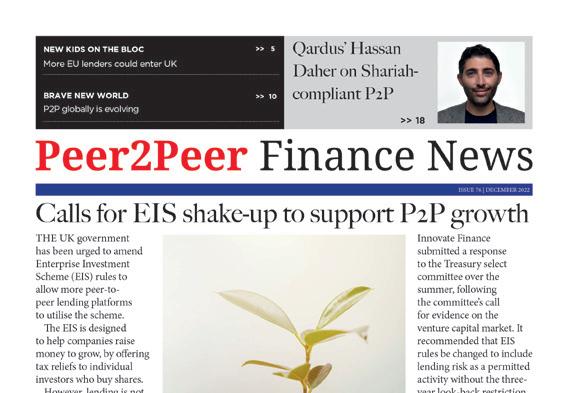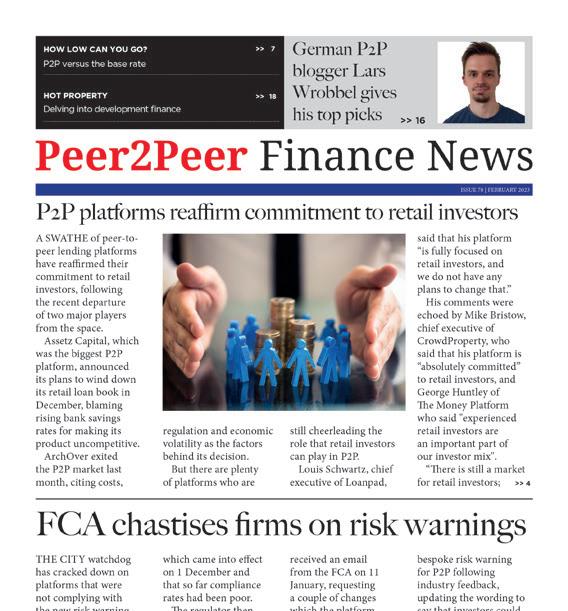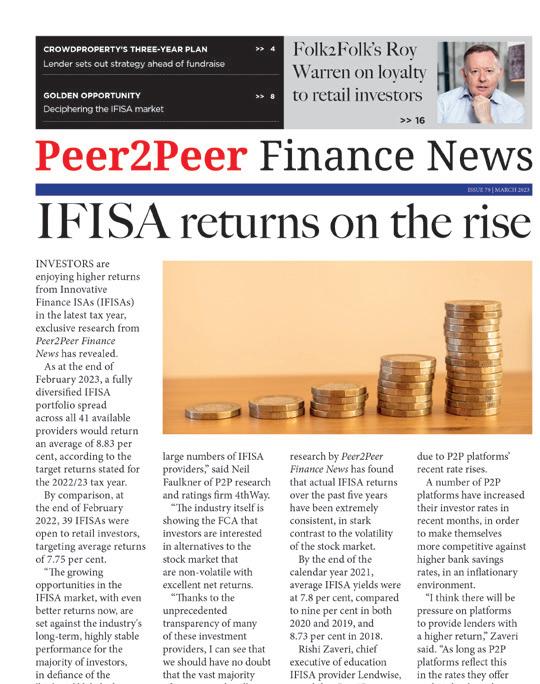Collateral investors face new legal hurdles to FCA compensation
INVESTORS in defunct peer-to-peer lending platform Collateral are facing new legal hurdles in their ongoing battle to get compensation from the regulator.


Despite opening compensation proceedings on behalf of investors earlier this year, the Financial Conduct Authority (FCA) is believed to be relying on a legal argument which requires investors to prove that the regulator was the “sole or primary cause” of Collateral’s collapse before making any payouts.
However, legal representatives have fought back, arguing that there is no evidence of this practice being used or referred to in any materials prior to June 2020.
Collateral went into administration in February 2018, leaving its investors with losses of up to £18m.
Earlier this summer, brothers Andrew and
Peter Currie, who were directors of Collateral, were sentenced to 2.5 years’ and 5.5 years’ imprisonment respectively for fraud and money laundering, following prosecution by the FCA.
The FCA then began compensation proceedings to recover investor funds, but warned that almost two thirds of the
outstanding loan book cannot be recovered.
However, investors are now concerned that the FCA’s “sole and primary cause” rule could supersede any legitimate compensation claim.
“Facing the prospect of numerous high-value investment scandals where traditional investor compensation frameworks
would not apply, such as in the £237m London Capital and Finance (LCF) scandal, as well as smaller scams such as Collateral, Premier FX and Lendy, the FCA sought to introduce changes to the rules governing the complaints and Financial Regulators Complaints Commissioner (FRCC) process,” said a legal representative for the Collateral investors.
“In particular, the FCA sought to cap complaints’ awards for financial loss at £10,000, and to refuse all pay-outs unless the FCA was the “sole or primary” cause of the loss. The cap was eventually abandoned but the “solely or primarily responsible” test was introduced last month as a new rule.”
The FCA is believed to have delayed the proposed changes due to public outcry whilst so many high-profile cases were in progress.
Following a >>
4 ISSUE 85 | SEPTEMBER 2023 SHOJIN
B Property platform seeks last external funding LIGHTBULB MOMENT Are
still
>> >> 5 12
>>
READIES FOR SERIES
P2P firms
innovating?
Purbeck’s Todd Davison on mitigating risk for lenders and borrowers
16


9.83% p.a. * † Earn up to *Don’t invest unless you’re prepared to lose money. This is a high-risk investment. You may not be able to access your money easily and are unlikely to be protected if something goes wrong. † Gross annual interest equivalent rate (compounded annually (Pool) / monthly (Select)) Kuflink Ltd (Company Number 08460508) is authorised and regulated by the Financial Conduct Authority since 2017 (Firm Registration Number 724890). Kuflink Ltd has its registered office at Level 1, Devonshire House, One Mayfair Place, W1J 8AJ. £270M Invested Over Visit kuflink.com or Call us at 01474 334488 2023 Kuflink invests up to 5% with you Secured against UK property* Secondary market available Operating since 2016 with Zero Investor losses to date IF-ISA Tax wrapper available
Published by Royal Crescent Publishing
124 City Road, London, EC1V 2NX info@royalcrescentpublishing.co.uk

EDITORIAL
Suzie Neuwirth
Editor-in-Chief suzie@p2pfinancenews.co.uk

Kathryn Gaw
Contributing Editor kathryn@p2pfinancenews.co.uk
Marc Shoffman Senior Reporter marc@p2pfinancenews.co.uk
PRODUCTION
Tim Parker
Art Director
COMMERCIAL
Tehmeena Khan Sales and Marketing Manager tehmeena@p2pfinancenews.co.uk
SUBSCRIPTIONS AND DISTRIBUTION tehmeena@p2pfinancenews.co.uk
Find our website at www.p2pfinancenews.co.uk
Printed by 4-Print Limited ©No part of this publication may be reproduced without written permission from the publishers.
Peer2Peer Finance News has been prepared solely for informational purposes, and is not a solicitation of an offer to buy or sell any peer-to-peer finance product, or any other security, product, service or investment. This publication does not purport to contain all relevant information which you may need to take into account before making a decision on any finance or investment matter. The opinions expressed in this publication do not constitute investment advice and independent advice should be sought where appropriate. Neither the information in this publication, nor any opinion contained in this publication constitutes a solicitation or offer to provide any investment advice or service.
The Treasury Committee’s recent inquiry into access to finance for small- and medium-sized enterprises (SMEs) feels particularly pertinent in today’s economic climate. Data from a wide variety of sources, including alternative lender Iwoca, debt advisory firm ACP Altenburg and trade body UK Finance all shows that mainstream banks are reining in SME lending.
During times of economic turmoil, it is typical for banks to pivot away from small businesses in favour of lending to bigger businesses. Unfortunately, this puts smaller firms in need of working capital under immense pressure.
However, such conditions can benefit alternative lenders, and we all know that peer-to-peer lending thrived during the credit crunch after the 2007-2008 financial crisis.
It appears that the need for alternative finance continues to this day. Recent research from embedded finance provider Sonovate found that seven in 10 smaller firms wouldn’t have survived the current crisis if it weren’t for alternative finance options, while 40 per cent of businesses said that it is easier to access finance from a fintech lender than mainstream banks.
Hopefully P2P lending platforms can capitalise on the banks’ conservative approach to lending and tap into a new era of borrowers who will support the industry’s growth, long after this latest credit crunch has ended.
SUZIE NEUWIRTH EDITOR-IN-CHIEF
We hope you’re enjoying the latest edition of Peer2Peer Finance News! We have now moved to a paid-for subscription model. If you would like to continue reading the magazine, please go to www.p2pfinancenews.co.uk/subscribe/ to find out about subscription options.

03 EDITOR’S LETTER
cont. from page 1
legal challenge from LCF investors, the ”sole or primary cause” rule was deemed to be invalid. The regulator went on to scrap the £10,000 cap on compensation, as part of a “clearer, more transparent” complaints scheme.
However, the “sole or primary” phrase remains a part of the FCA’s official rulebook, and Collateral investors face the prospect of proving that the FCA was a key cause of Collateral’s losses before making their compensation claims.
The legal representatives of the Collateral investors claim that the FCA should take financial responsibility for the losses, given that Collateral appeared on the FCA register, despite not holding the correct permissions.
Thomas Donegan, a partner at Shearman & Sterling who represented the LCF investors in their FCA complaints process and successful quest for government compensation, said that: “The issue of ‘regulatory accountability’ became a key point of controversy in the passing of the new Financial Services and Markets Act 2023, and the FRCC now has a bolstered role.
“If the FCA refuses compensation in the Collateral case, as it did

for LCF investors, then it will be interesting to see how the FRCC handles the matter. The FRCC has already found the FCA’s existing rulemaking on this topic to have been unlawfully introduced and that its related decisions in the LCF case were vitiated by legal error.”
Although UK government bodies and regulators are generally exempt from damages claims, they can be subject to judicial review or to complaints. Under the Financial Services Act 2012, the FRCC is entitled to consider complaints against regulators and recommend awards of damages.
Meanwhile, the Financial Services and Markets Act has bolstered the powers and status of the FRCC, and so Collateral investors have taken their complaint directly to the FRCC.
“If the FCA is itself
implicated in the Collateral scandal, as alleged by investors (e.g. including Collateral in the FCA register as an FCA-regulated firm when it was not), then it would be difficult for the FCA to take the position that it was not responsible,” added Donegan. “This is particularly the case given the FCA’s public advertising campaigns on the importance of investors checking the FCA register to check out legitimate firms.
“If the FCA now purports to avoid liability to Collateral investors by claiming that it was not “solely or primarily responsible”, well, the FRCC has already made clear that to do so would be incompatible with the Financial Services Act 2012. In the LCF case, the government’s compensation scheme rendered the FCA’s position unimportant.
However, for Collateral, where no other recourse exists for investors, the FCA should take heed of the FRCC’s previous decisions on this topic.”
The FCA said:
“Complaints are a valuable source of feedback that inform changes and improvements across the regulators. We take all complaints seriously and welcome the transparency and accountability that the scheme provides.
“We consulted on changes to improve the Complaints Scheme, including to clarify our approach to compensatory payments, which were finalised in July.
“Any complaints we received before the implementation of the revised scheme in November will be assessed under the previous complaints scheme. That includes all the complaints we received related to Collateral. We were unable to respond to these while we prosecuted two men for charges covering the fraudulent changing of the FCA’s Register and removal of large sums of cash from the Collateral accounts. Following convictions they were sentenced to a total of eight years imprisonment in July. Now that the prosecution has ended, we are progressing the complaints.”
NEWS 04
Shojin eyes Series B by the end of the year
SHOJIN Property Partners could launch a Series B fundraising later this year, in what will most likely be its last time seeking external funding, according to chief executive Jatin Ondhia.

Ondhia (pictured) told Peer2Peer Finance News that the group has grown its revenue by 50 per cent over the 12 months to June and it is continuing on a growth path. The firm will probably launch its Series B in the last quarter of the year. It will follow its Series A, which raised £3m in 2022 at a valuation of £49m.
Shojin Property Partners has been profitable for the last three years, Ondhia said, posting core earnings of around £500,000 in its latest annual results.
Ondhia said the group has invested in developing the business this year and is now looking to make several hires across different areas of the business including origination, marketing and investor relations.
Peer2Peer Finance News previously revealed that Shojin was in talks with private equity firms over a new fund for junior lending. Ondhia said the firm is very close to agreeing partnerships with some private equity firms to deploy money into the space.
Shojin has been big on partnerships since it was launched in 2009. But this has focused mostly on distribution through wealth managers, until now. In August,
the group announced two new partnerships, with German real estate investment platform
Linus Digital Finance and Reinvest24, an Estonian real estate crowdfunding platform.
“It’s something we’ve been talking about for a while,” Ondhia said. “I believe the market is going to grow with
deeper collaboration across platforms. We need to work together already to standardise terminology and risk metrics. We can also cross-pollinate opportunities.”
This is the first time the group has partnered with another platform, but it will not be the last. Ondhia said he is in talks with several platforms in different countries including India and Singapore.
He is also continuing conversations with potential distribution partners, growing in India, Hong Kong and Singapore, while looking to add Dubai and Israel. The next markets on the list are Saudi Arabia, Canada, Australia and South Africa.
Kuflink eyes £0.5bn loan book by 2025
KUFLINK is aiming to grow its loan book to £0.5bn by the end of 2025, as the property lending platform looks to scale up. This would represent a doubling of the company’s loan book value. At the time of writing, investors have put more than £271m into the platform, while just over £169m had been repaid in capital.
Chief executive Narinder Khattoare told Peer2Peer
Finance News that the halfbillion-pound goal is “a very aggressive target” but he believes it is achievable. However, he added that the company is not prepared to relax its risk criteria in order to meet this target.
“£0.5bn is a very aggressive target,” said Khattoare. “Could we get there? I don’t know. There are a lot of factors at play, and we don’t want to have
a half-billion-pound book which is not performing well.
“For me, the key thing is getting the money out there to fund more loans, and we have those systems, processes and governance in place which mean that we’re now in a mode where we can scale the business.”
Khattorare added that his priority is to cultivate a loan book which is
performing well for both borrowers and investors, as well as Kuflink’s own shareholders.
Kuflink has been on a push for growth in recent years and recently secured a funding line with Paragon Bank worth £35m. This money will be used to onboard even more loans and to bolster the business during an uncertain economic environment.
05 NEWS

Cur8 Capital launches Shariah-compliant IFISA
SHARIAH-COMPLIANT investment platform
Cur8 Capital has launched an Innovative Finance ISA (IFISA).
Cur8 Cash was launched in the middle of August, enabling consumers to earn returns ranging from 4.6 per cent to 4.9 per cent by holding funds in pounds or dollars respectively.
Co-founder Mohsin Patel told Peer2Peer Finance News that the new product is “quite groundbreaking” as it enables investors to earn tax-free returns while complying with Islamic values.
Earning interest is forbidden under Islamic
law, so observant Muslims cannot use cash ISAs.
Cur8 Capital’s IFISA offers individuals a share of profits rather than interest.
It also gives investors the option to hedge their risk by putting some of their portfolio in dollars, with one-month access which it says gives much better
liquidity than Islamic banks’ deposit accounts.
Patel said that Cur8 Cash has “got off to a good start” and that the platform is planning to offer more IFISA-eligible products in the future, which could potentially include real estate investments.
Cur8 Capital is owned
by Islamic Finance Guru, which is authorised by the Financial Conduct Authority.
The company’s mission is to level the playing field and help the Muslim community, which Patel said is currently underserved by mainstream financial products.
As well as Cur8 Cash, it offers real estate, venture capital and fixed income investments, all of which are Shariah-compliant but not currently ISA-eligible.
“It’s not just about the returns, it’s about making an impact,” said Patel. “All investments are ethical and consistent with Shariah principles.”

Consumer Duty: “Treating customers fairly on steroids”
FOR many peer-to-peer lending platforms, who are used to extra scrutiny from the regulator, complying with the new Consumer Duty hasn’t been that big of a problem, industry insiders say.
The Financial Conduct Authority’s new Duty came into force on 31 July, requiring regulated financial services firms to put customers’ needs first.
For Paul Auger, chief operations officer at Kuflink, the concept behind the Consumer Duty has been around
for several years, it’s just that now it is “treating customers fairly on steroids”.
And although it has mainly resulted in some tweaks to practices – like changing frequently asked questions and explanations on websites to make them as clear as possible – rather than any major overhaul, it is just another way that the cost of compliance is increasing for firms.
Although some have previously argued that the Duty might lead to stricter lending criteria, according
to Brian Bartaby, chief executive of Proplend, the new rules shouldn’t lead to such drastic changes.
“We have a fairly well-structured credit policy we built over the years,” he said. “If you’re making changes to your credit policy based on the Consumer Duty, then it wasn’t right in the first place.”
But one area Bartaby thinks might be impacted is client money accounts at other platforms. While Proplend pays the interest from those accounts to
the clients, he pointed out that most other platforms retain the interest they earn on client money.
Jatin Ondhia, chief executive of Shojin Property Partners, says that although compliance hasn’t been too difficult, as the platform focuses on high-net-worth, sophisticated investors, it is a shame that there are now a lot of new restrictions on retail investors.
“It’s going against the grain of what crowdfunding is about,” he said.
07 NEWS
•





The world’s leading resource on peer-to-peer lending Subscribe today for full online access Peer2Peer Finance News (p2pfinancenews.co.uk) is the premier source of in-depth news, analysis, and insights on the fast-growing peer to peer lending industry. As a subscriber, you’ll have access to:
High-quality coverage of key topics impacting the P2P industry and its investors.
•
Up-to-the-minute news, features and opinions from P2P lending experts and industry professionals.
Daily news and analysis from Monday to Friday, and daily and weekly newsletters. Subscribe for just £1 for the first three months!* £9.99/month thereafter. Cancel anytime. Go to https://p2pfinancenews.co.uk/subscribe to sign up now.
•
Unbolted and Abundance vow to keep low minimum investment threshold

UNBOLTED and Abundance Investment have pledged to keep their low minimum investment thresholds, despite the increased cost of compliance in the retail space.
The Financial Conduct Authority (FCA) has imposed stricter regulations on the peerto-peer lending sector, including marketing restrictions and more stringent investor onboarding processes. This has been compounded by the new Consumer Duty, introduced at the end of July, which further increases the onus on all regulated firms to set high standards of customer service and protection.
Higher compliance costs
have led platforms such as JustUs, Brickowner and most recently, Kuflink to increase their minimum thresholds.
However, some platforms remain open to extremely small minimum investments.
P2P pawnbroking platform Unbolted offers short-term loans secured by luxury assets, which can be funded with as little as £1. Annual returns can be
as high at 10.2 per cent.
Chris Brown, head of lending and operations at Unbolted, said the platform felt “no need to impose a minimum investment level”.
“Our platform works on the fast flow of lots of six-month loans, some of which are at a relatively low value,” he added. Meanwhile, ethical crowd bonds platform Abundance Investment offers its users the chance to invest in local councils and companies that are developing green energy projects. Investors can earn annual returns of up to eight per cent with a minimum investment of £5.
Abundance’s managing director Bruce Davis said that the platform has
“no plans” to increase its minimum threshold, “especially given our focus on democratic finance working with local councils”.
He added that while stricter regulations on the sector “have had a significant impact on our ability to recruit new customers”, Abundance has “no plans to change one of the founding principles of the platform”.
Davis, who is also a founding director of the UK Crowdfunding Association (UKCFA), which represents the industry, said that “the UKCFA continues to communicate both with the FCA and the Treasury about the unintended consequences of the new rules.”
Deadline approaches for awards nominations
THERE is just one week left to submit your nominations for this year’s Peer2Peer Finance Awards! Make sure to submit your entries by 8 September, so we can ensure that the best platforms and service providers are considered for the peer-to-peer lending industry’s most prestigious accolades.
“The quality and breadth of entries for this year’s Peer2Peer Finance Awards has been fantastic
so far and we encourage everyone who has not yet submitted a nomination to do so before the deadline,” said Peer2Peer Finance News founder and editorin-chief Suzie Neuwirth.
“With just over three months to go until the awards ceremony, I can’t wait to get the judging process underway so that we can unveil this year’s shortlist.”
Go to https:// p2pfinancenews.co.uk/ category/awards for more
information on the awards and how to submit a nomination.
The judges for this year’s awards are Mike Carter, policy lead for lending platforms at Innovate Finance; Neil Faulkner, chief executive of 4th Way; Conrad Ford, chief product and strategy officer at Allica Bank; P2PFN’s contributing editor Kathryn Gaw; and Neuwirth.
The Peer2Peer Finance Awards 2023 will take
place on 12 December at the Hurlingham Club in London, with the winners to be announced on the night.
This year’s awards event has a Hollywood theme, live band, sparkling drinks reception and gala dinner.
If you wish to participate in this year’s event, please email sales and marketing manager Tehmeena Khan at tehmeena@ p2pfinancenews.co.uk for more information on tables and sponsorship.
09 NEWS
The Peer2Peer Finance
The Peer2Peer Finance Awards take place on Tuesday 12 December 2023, at the Hurlingham Club in London.

This glittering event will celebrate the best and brightest players in the peer-to-peer lending industry and the stakeholders who support them.
Attendees can enjoy a sparkling drinks reception and gala dinner. This year we are delighted to announce a Hollywood theme for the event, as well as a live band for attendees wishing to celebrate (or commiserate) after the awards ceremony!


Nominations for this year’s awards close on 8 September. Go to https://p2pfinancenews.co.uk/ category/awards for more information on how to apply.
There is limited space at this event, with many tables already sold. For table sales and sponsorship enquiries, please email sales and marketing manager Tehmeena Khan at tehmeena@ p2pfinancenews.co.uk for more information.
Photo from last year's awards event
Finance Awards 2023
Peer2Peer Finance Awards 2023: The full list of categories


1.
2.
3.
12.
13.
14.
16.
19
20.
21.
24. Development Broker of the Year *NEW*

25. Commercial Broker of the Year *NEW*
26. Investor’s Choice Award *This is chosen by P2PFN‘s investor readers and is not dependent on industry nominations*
Business Advisory Firm of the Year
Debt Advisory Firm of the Year
Restructuring Firm of the Year
Open Banking Provider of the Year
P2P Software Provider of the Year
P2P Institutional Partner of the Year
Law Firm of the Year
Property Law Firm of the Year *NEW*
Consumer Lender of the Year
Business Lender of the Year
Property Development Lender of the Year
4.
5.
6.
7.
8.
9.
10.
11.
Bridging Lender of the Year
Property Lender of the Year
*NEW*
Commercial
Lender
Property
of the Year *NEW*
15. Residential Property Lender of the Year *NEW*
Ethical Lender of the Year
Star
Financial Inclusion
17. Rising
18.
Award
Innovative Lender of the Year
CEO of
the Year
IFISA
Provider of the Year
22. P2P Lending Platform of the Year
23. Bridging Broker of the Year *NEW*
Photo from last year's awards event
Photo from last year's awards event
The next big thing
Peer-to-peer lenders are innovation experts, but regulation and economic strife are forcing platforms to think outside the box once more. Kathryn Gaw reports
IN TIMES OF ECONOMIC turbulence, innovation thrives. And no sector has better demonstrated this trend than peer-to-peer lending.
P2P lending rose from the ashes of the 2007-2008 financial crisis, offering an alternative to high street banks for both borrowers and investors. As the sector grew in popularity, new technologies were embraced. P2P lenders were among the first to onboard
open banking capabilities, and to use algorithmic credit checking software to speed up decision making. They have been the pioneers of the Innovative Finance ISA (IFISA), and have adapted to a raft of changing regulations over the past few years, working closely with the Financial Conduct Authority (FCA) in the process.
Now, as the P2P sector approaches its 20th anniversary, the economy is once again in
flux. Rising interest rates, a cost-of-living crisis, a chronic nationwide housing shortage and a lack of business financing are heaping pressure on households, with no end in sight.
Unsurprisingly, P2P lenders are once again stepping up by offering new products and services in response to the changing economic environment. Platforms are now looking towards artificial intelligence (AI) and

12 INNOVATION IN P2P
other forms of machine learning, creating new paths for customer acquisition, introducing crypto lending services, and moving into new geographical markets.

“If you stop being innovative you’ll become stagnant and then you’ll get left behind,” says Gurbinder Ghuman, head of investor relations at Kuflink.
“You have to get at the forefront of innovation to keep up with current trends.
“AI is the big hype now and we can use those tools to integrate new technologies. We believe the future is going to be the phone.
We already have an app and we’re already using AI so we just need to bring them all in line.”
Last year, Kuflink stated that AI is “the next frontier for lending”, and revealed that it had already begun building support algorithms to predict future trends based on historical data. The platform is currently looking into AIpowered chat boxes and other possible solutions which can streamline its investor process.
Meanwhile, Islamic P2P platform Qardus uses machine learning
an eye on the crypto space as a potential future source of growth and innovation. Last year, Moneybrain – the sister company of P2P lender JustUs – secured temporary permissions from the FCA to offer its crypto trading services. However, since then, the regulator has clamped down on the crypto market, making it harder for new entrants to move into this area, and for existing players to market their products to new investors.
Lee Birkett, founder of JustUs
for its credit risk scoring, and Crowd2Fund’s automated investing tool SmartInvest incorporates AI.

“AI has been around for ages,” says Ghuman. “Its something that we are learning more and more about and trying to see where it is best placed and suited for our space, whether it be for signs-ups, or as a chat robot. It’s a powerful tool.”
Other platforms are keeping
and Moneybrain, believes that P2P and crypto lending are natural bedfellows, and should be allowed to operate in similar ways, using the same underlying technology.
“When investors and lenders are matched on P2P its just a one-to-one transaction,” Birkett says. “Crypto is also one-to-one.
“Our crypto is built on top of our P2P platform and so is everything else. The future is P2P lending
13 INNOVATION IN P2P
“ If you stop being innovative you’ll become stagnant and then you’ll get left behind”
via crypto. But the problem is the regulator won't let you do it.”
Earlier this summer, the FCA debuted a series of new crypto asset marketing regulations which were immediately recognisable to any P2P stakeholders.

Similarly to the FCA’s P2P marketing rules, from 8 October 2023 all businesses marketing crypto assets to UK consumers will need to introduce a coolingoff period for first-time investors. The regulator has also banned ‘refer a friend’ bonuses and all crypto firms are now required to put clear risk warnings on their websites, and to ensure that adverts are clear, fair and not misleading.
These new rules make it harder for new crypto lenders to establish a presence in the UK, at least among retail investors. As a result, crypto firms such as Moneybrain are leaving the country.
“The problem is the UK hasn’t got the regulation yet,” says Birkett. “Its being done in a lot of countries – in the UK they just put their hands in the air.”
Moneybrain recently opted to relocate to Jersey, where it can continue to operate its crypto lending business. Birkett now believes that the future of crypto lies overseas. He intends to apply for a European Crowdfunding Service Providers (ECSP) license, with a view to opening a new office in Paris within the next two years.
“The UK government has
acknowledged that crypto lending will form part of the second phase of crypto laws and regulations, but that’s not going to happen until 2025,” Birkett explains.
“So we will be looking to launch in 2024 in Europe from Paris.
“Europe holds more promise for P2P than the UK. Ironically, European P2P will be able to serve the UK and Europe while the UK can’t even serve its own consumers.”
The European P2P market has always been less mature than the UK market, but thanks to a
combination of Brexit disruption, FCA regulations and economic volatility, Europe has been gaining on the UK, at least in terms of P2P innovation. Across the Channel, there are more than 100 active P2P lending platforms, offering loans on a wide range of assets such as land, solar panels, property, businesses, and consumer credit.
European P2P stakeholders believe that the new Markets in Crypto Asset (MiCA) regulation will present new opportunities for innovative fintech companies. However, these opportunities may not extend to retail investors.
“Some platforms already use distributed ledger technology (DLT) in the back office and have also run tokenised campaigns,” explains Oliver Gajda, co-founder and chairman of the European Crowdfunding Network.
“The temporary DLT pilot regime
14 INNOVATION IN P2P
“ We hope that the deluge of new rules abates sufficiently to allow businesses to plan, invest and innovate for the benefit of customers for the long term”
will allow for experimentation here, so we should see more of this in the future.
“There have also been some attempts at crypto-only platforms, but the main issue has been usually that crypto has not been allowed for securities (some member states have clarified that crypto transactions will fall under securities law if they act as securities) without the same regulatory burden as traditional finance. The benefit of crypto in that case has been the back office benefits.”

Both Kuflink’s Ghuman and JustUs’ Birkett believe that the European market is where the latest innovations are happening in P2P, and most P2P insiders have openly called out the FCA’s heavy handed approach towards regulation for hindering growth in the sector. Birkett says that
Europe is “eating the UK’s lunch” by benefitting from the innovative practices of UK P2P, without the crippling regulatory burden.
“The sector is being asked to respond to unprecedented levels of regulatory changes – from financial promotions to secondary markets – and the ongoing uncertainty that creates makes it challenging to invest in long term innovation,” says Bruce Davis, co-founder of Abundance Investments.
“We hope that the deluge of new rules abates sufficiently to allow businesses to plan, invest and innovate for the benefit of customers for the long term.”
For its part, Abundance is opting to focus on its work with public sector organisations such as local councils.
“This is a very promising area for further innovation, and alongside the long-term
prospects of the new proposals for the public, offers platforms to allow larger scale investment via crowdfunding,” Davis adds.
However, others don’t see the need for innovation for the sake of innovation. Many platforms have responded to the current economic volatility by simply showcasing their ability to react quickly and deliver value for investors. Loanpad has increased its investor returns eight times over the past year, in a bid to demonstrate its agility to investors.
“Our philosophy from an investor perspective has always been to keep it as simple as possible, so in that regard we don’t see ourselves changing anything or adding any complexities,” says Louis Schwartz, founder and chief executive of Loanpad.
“We believe our investors already have as seamless an experience as is possible, which is a major focus for us.
“On the borrower side we have superb origination channels to grow the portfolio so we are sticking to our tried and tested model and not looking to innovate in that area.”
P2P is an inherently innovative sector, which continuously demonstrates its ability to evolve and adapt to new market conditions. Even if its future doesn’t lie in AI or crypto lending, the sector will continue to find new ways to respond to borrower and investor demand – either at home or abroad.
15 INNOVATION IN P2P
“ The future is P2P lending via crypto”
Reducing risk
Todd Davison, managing director of Purbeck Insurance, talks to Marc Shoffman about the benefits of personal guarantee insurance for peer-to-peer lenders and businesses
RISING RATES AND stretched affordability can make it harder for borrowers to access finance.
Many lenders, including some peer-to-peer lending platforms, may ask for personal guarantees from directors to reduce the risk of business loans.
This passes some of the risk to the business director though and is an area Purbeck Insurance is trying to address with personal guarantee cover.
Todd Davison, managing director of Purbeck, explains how the brand’s unique personal guarantee product aims to give lenders reassurance when providing funds, and also helps directors access much-needed finance.

Marc Shoffman (MS): What does Purbeck Insurance do?
Todd Davison (TD): We help UK small- and medium-sized enterprises (SMEs) focus on unique niche risks and develop risk management solutions for them. The product is a critical tool.
When a small business is going to raise finance, such as through P2P lenders, the director is often asked to sign a personal guarantee. This gives the lender recourse if the loan isn’t repaid as they can go after the director.
That creates a risk for SMEs though so we wanted to develop
a product that gives them the chance to talk about business finance, grow the top line and provide a safety net for the director providing the guarantee.
We are trying to position ourselves to champion UK SMEs while growing their business. It can help where lenders are reticent to provide finance.
MS: How do you work with P2P lenders?
TD: We have worked with a number of P2P lenders where a personal guarantee is required, they will introduce the client for us to consider. Since we launched back in June 2017, we have supported 2,000 SMEs and provided £250m of personal guarantees. Of that,
16 PROFILE
£95m is in respect of P2P lenders. A lot of the time these loans are completely unsecured so a lender is taking the personal guarantee as security, which provides risk for directors.
Our aim is to have a proactive contract. It isn’t just an indemnity we are providing. The service also helps a business manage risks. We ask directors to give us a call if they are facing issues with cashflow, that is the first step in a claim.
MS: How easy is it to sell the benefits of your product?
TD: Our conversion rate is 80 per cent, that tells me the product is priced quite well on an affordability basis particularly when you look at the cost of business loans. It is not just a commodity driven product because of the services we have built in beyond the indemnity.
We have finessed our sales messages around the benefits. It is about a director understanding the risk of signing that personal guarantee and protecting themselves. We feel we have proved the risk to make sure it isn’t a friction point.
Our research shows around 29 per cent of SMEs didn’t take out business finance because of the risk of signing a personal guarantee, but 74 per cent said they would if they could insure against it. It comes hand in hand with wanting to access finance and having a safety net if things go wrong.
MS: How do you price the indemnity?
TD: We look at the premium in the same way lenders will assess the loan. It is about considering the financial strength of the business, the sector, their balance sheet compositions and the director’s
track record. The premiums are predominantly driven by the financials and creditworthiness of the business that is then applied to the personal guarantee.
MS: How much demand is there for this indemnity?
TD: There is no other facility like this in the UK. We had our first quarterly fall in demand during the second quarter of this year but I think some of that is to do with the macroeconomic headwinds and interest rates rising.
Demand was still up annually though. We are seeing more and more enquiries coming through. This product can protect businesses when times are tough.
MS: Who are your typical customers?
TD: If you look at a cross section of our book, it is very representative of the SME market. It includes sectors such as construction and manufacturing, where we have the largest concentration, but there is also demand from hospitality and retail where we have seen more claims activity.
We are also getting a number of enquiries where there has been a business acquisition. There have been a number of instances where the deal hasn't gone to plan. For example, the acquiror would find the business has debts to pay off previous shareholders.
MS: How will you develop your offering?
TD: One of our big ambitions is to develop these unique guarantees. We are working on a new landlord-focused product to protect those with buy-to-let portfolios in a limited company. There are lots of legislative and
regulatory changes for landlords to cope with and lots are putting their portfolios in limited companies.
We have had a number of enquiries about guarantees and have been working with insurers, so we are looking to launch a spin-off.
MS: Do you expect to see more claims on the indemnities due to the economic climate?
TD: Insolvencies are rising, so it is possible that there will be more claims on the guarantees. Businesses are dealing with the economic environment and late payments. Many firms got government support during the pandemic such as coronavirus business interruption loans or used deferral schemes. This gave them a lifeline and delayed a lot of insolvencies, but more may be happening now.
We are certainly seeing an increase in terms of claims but also our book is bigger now so we have more clients.
MS: How can P2P lenders work better with you?
TD: The main challenges we have as a business is the market awareness of what we are doing. We would be keen to work with more lenders to support them and their clients. We are typically working with smaller P2P lenders, where it has worked it has been successful in terms of referrals. It takes time to develop relationships and work out a lender’s risk assessment. The onus is on us to continue to raise awareness and profile and in time we will continue to evolve our relationships. Our objective is to make this solution more prominent in the commercial finance space to directors and lenders.
17 PROFILE
INVESTMENT PLATFORMS
Assetz Exchange is a property investment platform delivering long term stable income for investors, primarily through the purchase and leasing of housing for social good. Regulated by the FCA, it provides the opportunity for investors to create a diversified property portfolio and alternative funding options for the housing sector.

www.assetzexchange.co.uk
T: 03330 119830
E: info@assetzexchange.co.uk
easyMoney is a peer-to-peer property lending platform that is fully authorised by the Financial Conduct Authority #231680. It has £164m+ in investor funds currently deployed and £280m+ in total loans written to date. It has had no borrower defaults and no investor has ever made a loss. Among P2P firms surveyed by Peer2Peer Finance News it has the largest active Innovative Finance ISA portfolio, with over £65m currently invested. easyMoney.com

T: 0203 858 7269
E: contactus@easymoney.com
Folk2Folk is a profitable UK lending and investment platform. More than half a billion pounds has been invested via the platform with no investor losses to date. Loans are a maximum of five years, secured against land/property at a maximum 60 per cent LTV, with a fixed rate of between 7.5 and 9.5 per cent, per annum.
www.folk2folk.com
T: 01566 773296
E: enquiries@folk2folk.com
Invest & Fund is an established alternative finance platform that has deployed over £257m on clients' behalf and has repaid over £158m to lenders with zero per cent bad debts written off. Lenders can achieve a diversified, asset-backed portfolio with gross yields averaging from 6.75 per cent to 7.5 per cent per annum with an option to lend through an ISA or a SIPP for tax-free returns.

www.investandfund.com
T: 01424 717564
E: lending@investandfund.com
JustUs is an innovative peer-to-peer lender that provides a range of consumer and property-backed loans. It has lent out more than £25m and paid more than £1.7m in interest to lenders to date. Investors can enjoy returns of up to 10.98 per cent, with all products eligible to be held in an Innovative Finance ISA for tax-free earnings.
www.justus.co
T: 01625 750034
E: support@justus.co

Kuflink is an award-winning lender and online investment platform. With over £260m invested through the platform, investors can customise their own portfolio investing in specific loans or in a pool of loans diversified across a number of opportunities. Earn up to 9.73 per cent (compounded) per annum, with an IFISA available.
www.kuflink.com
T: 01474 33 44 88
E: hello@kuflink.com

18 DIRECTORY
LANDE is a crowdfunding platform that gives investors access to secured agricultural loans. It has created a unique scoring model, accessible infrastructure, and a variety of products so that farmers are able to access financing quickly and easily. With LANDE and its investors as partners, farmers can become more independent and sustainable, while improving their yield, efficiency and profitability. Projects offer interest rates of up to 14 per cent per annum.
https://lande.finance
T: +371 20381802
E: info@lande.finance
Lendwise is the UK’s only peer-to-peer lender that is dedicated to impact investing in education finance. Investors finance education for borrowers at universities and business schools across the UK and globally. Investors define their own risk appetite and use Lendwise’s AutoLend feature to diversify their strategy across a pool of loans, which can be invested in an IFISA wrapper earning average returns of up to nine per cent per annum.
www.lendwise.com
T: 0203 890 7270
E: lenders@lendwise.com
Lending for over eight years, Somo is a seasoned bridging lender specialising in providing short-term secured loans against UK property. Somo gives its lenders the opportunity to tailor their investments according to their risk tolerance, selecting interest rates and loan-to-value ratios that align with their preferences, with a minimum investment of £5,000.
W: www.somo.co.uk/how-it-works
T: 0161 312 5656
E: investors@somo.co.uk


SERVICE PROVIDERS AND INDUSTRY ORGANISATIONS
The European Crowdfunding Network (EuroCrowd) is an independent, professional business network promoting adequate transparency, regulation and governance in digital finance while offering a combined voice in policy discussion and public opinion building. It executes initiatives aimed at innovating, representing, promoting and protecting the European crowdfunding industry. www.eurocrowd.org
E: info@eurocrowd.org
Q2 creates simple, smart, end-to-end lending experiences that make you an indispensable partner on your customers' financial journeys. Its modular platform gives you the ability to manage lending simply throughout the entire loan lifecycle, from application, onboarding, servicing to collections. The result is a better experience for both borrowers and lenders.
https://eu.q2.com
T: 020 3823 2300
E: info@Q2.com

19 DIRECTORY







































